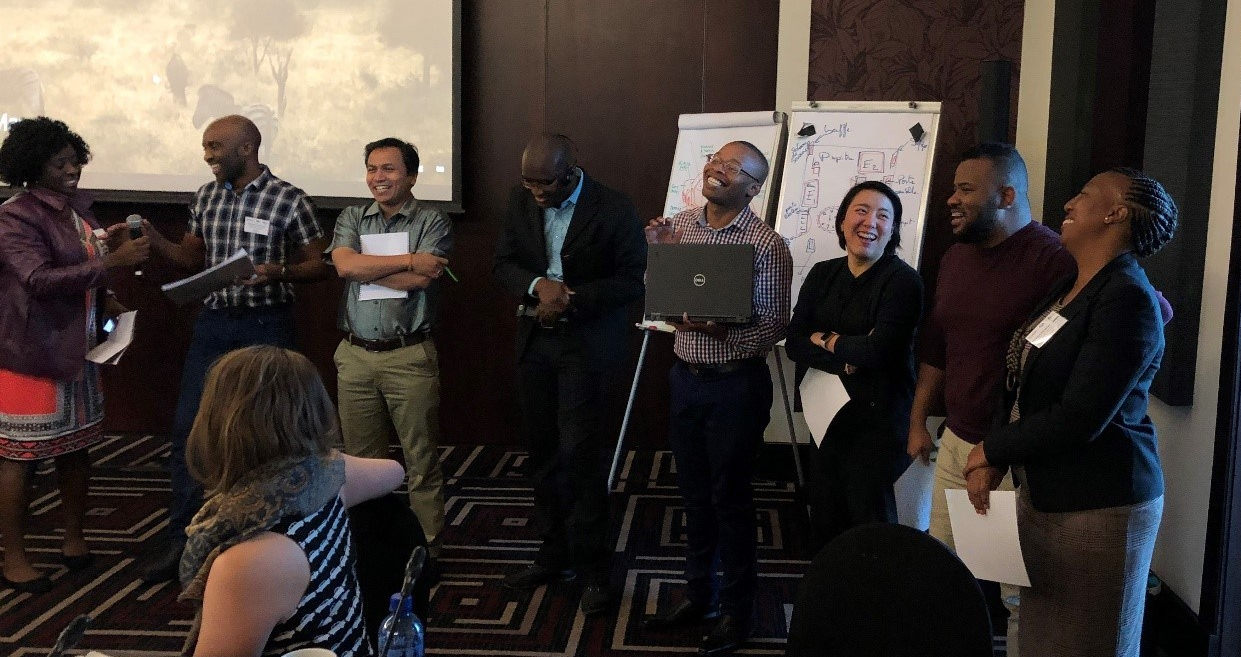Event Date
Written by Elizabeth Eckard, Program Officer, LINKAGES

Country managers and technical leads from Liberia, Zambia, Nepal, Mali, South Africa, Thailand, Jamaica, and Lesotho report on their planned priorities following the Optimization Meeting.
Between April 29-May 3, the USAID- and PEPFAR-supported LINKAGES project convened the 2019 Global Optimization Workshop in Johannesburg, South Africa. The workshop brought together technical and strategic information staff from 24 countries to review and discuss strategies for optimizing implementation of critical interventions and new technologies for achieving epidemic control. Participants included local implementing partners, representatives from FHI 360; USAID Missions in Lesotho, Uganda, and South Africa; Pact; and IntraHealth International.
Objectives
The workshop’s objectives were for country teams to: 1) learn to optimize existing and new strategies to achieve 95-95-95 targets for key populations; 2) improve skills in data analysis and visualization to improve 95-95-95 performance; and 3) strengthen strategies and country plans to improve performance of programming for men who have sex with men. It was a platform for LINKAGES to promote state of the art and innovative technical approaches and for cross-country knowledge sharing and collaboration between field staff and implementing partners.

Onneile Komotere, Masego Gilbert-Lephodisa, and Kagiso Osupeng from Botswana and Pablo Mabanza from DRC present their work during a stakeholders mapping activity.
Optimization in action
Participants gathered daily for sessions led by both country and headquarters staff, small group discussions, and group exercises. The design of the sessions around south to south exchange allowed implementers to share their strategies for success with other countries and work together to find solutions to implementation challenges. A WhatsApp group was created as an informal space for participants to pose questions and share strategies throughout the week, and it continues to be used post-workshop.
Over the course of the week, sessions focused on the areas of:
- Data analysis and use, including high-frequency reporting
- Antiretroviral therapy (ART) optimization, including tenofovir/lamivudine/dolutegravir (TLD) transition
- Multi-month scripting and dispensing (MMS/D)
- Viral load testing, reporting, and monitoring
- Long term retention strategies, such as peer navigation
- Index testing, including voluntary partner referral and risk network referral
- Pre-Exposure Prophylaxis (PrEP)
- Enhanced Peer Outreach Approach (EPOA)
- HIV self-testing
- Undectable = Untransmittable (U=U) messaging
- Using online platforms to reach KPs and link them to services
- Motivational interviewing
- Safety and security of implementers
- Client satisfaction as a catalyst for service uptake
- Microplanning
- Scientific abstract writing
- Preparing local partners for transition awards
Workshop takeaways
The participants left the workshop with action plans in hand for how they will accelerate progress toward 95-95-95 in their countries. They include plans for improving demand for and access to viral load testing; TLD transition; rolling out differentiated services such as MMS/D for patients stable on ART; and scaling up PrEP and index testing, among other technical priorities. Participants also left with an understanding that high frequency reporting is the new normal. All LINKAGES country teams will immediately begin weekly data reviews to guide programming and better manage performance issues. Finally, participants left the workshop motivated and inspired – by the new knowledge and insights gained and exchanged and by the increased sense of belonging to a global project contributing to epidemic control.
